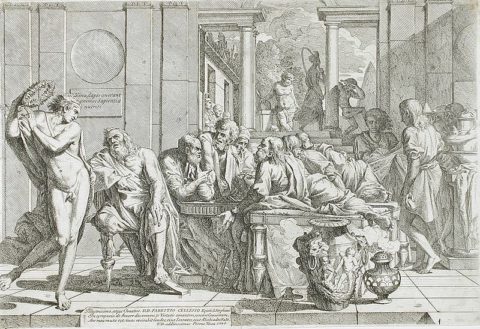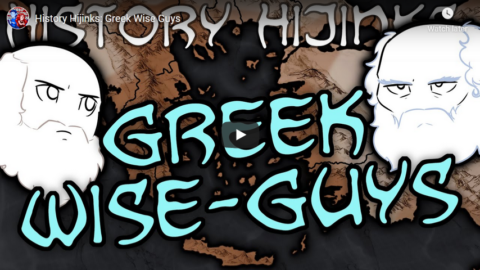Theophilus Chilton pulls up an older essay from the vault, discussing tribalism, how it likely arose, and examples of cultures that relapsed into tribalism for various reasons:
In this post, I’d like to address the phenomenon of tribalism. There can be two general definitions of this term. The first is attitudinal – it refers to the possession by a group of people of a strong ethnic and cultural identity, one which pervades every level and facet of their society, and which serves to separate (often in a hostile sense) the group’s understanding of itself apart from its neighbours. The second definition is more technical and anthropological, referring to a group of people organised along kinship lines and possessing what would generally be referred to as a “primitive” governmental form centered around a chieftain and body of elders who are often thought to be imbued with supernatural authority and prestige (mana or some similar concept). The first definition, of course, is nearly always displayed by the second. It is this second definition which I would like to deal with, however.
Specifically, I’d like to explore the question of how tribalism relates to the collapse of widely spread cultures when they are placed under extreme stresses.
There is always the temptation to view historical and pre-historical (i.e., before written records were available) people-groups which were organised along tribal lines as “primitives” or even “stupid”. This is not necessarily the case, and in many instances is certainly not true. However, tribalism is not a truly optimal or even “natural” form of social organisation, and I believe is forced onto people-groups more out of necessity than anything else.
Before exploring the whys of tribalism’s existence, let’s first note what I believe can be stated as a general truism – Mankind is a social creature who naturally desires to organise himself along communal lines. This is why cities, cultures, civilisations even exist in the first place. Early in the history of Western science, Aristotle expressed this sentiment in his oft-quoted statement that “Man is by nature a political animal” (ὁ ἄνθρωπος φύσει πολιτικὸν ζῷον). This aphorism is usually misunderstood, unfortunately, due to the failure of many to take its cultural context into account. Aristotle was not saying that mankind’s nature is to sit around reading about politicians in the newspaper. He was not talking about “politics” in some sort of demotic or operational sense. Rather, “political” means “of the polis” [” rel=”noopener” target=”_blank”>link]. The polis, in archaic and classical Greece, was more than just a city-state – it was the very sum of Greek communal existence. Foreigners without poleis were not merely barbarians, they were something less than human beings, they lacked a crucial element of communal existence that made man – capable of speech and reason – different from the animals and able to govern himself rationally. “Political” did not mean “elections” or “scandals”, as it does with us today. Instead, it meant “capable of living with other human beings as a rational creature”. It meant civilisation itself. Tribalism, while perhaps incorrectly called “primitive”, nevertheless is “underdeveloped”. It is in the nature of man to organise himself socially, and even among early and technologically backwards peoples, this organisation was quite often more complex than tribal forms. While modern cities may be populated by socially atomised shells of men, the classical view of the city was that it was vital to genuine humanity.
My point in all of this is that I don’t believe that tribal organisation is a “natural” endpoint for humanity, socially speaking. The reason tribes are tribes is not because they are all too stupid to be capable of anything else, nor because they have achieved an organisation that truly satisfies the human spirit and nature. As the saying goes, “The only morality is civilisation”. The direction of man’s communal association with man is toward more complex forms of social and governing interactions which satisfy man’s inner desire for sociability.
So why are tribal peoples … tribal? My theory is that tribalism arises neither from stupidity or satisfaction, but as a result of either environmental factors such as geography, habitability, etc. which inhibit complexification of social organisation, or else as a result of civilisation-destroying catastrophes which corrode and destroy central authority and the institutions necessary to maintain socially complex systems.
The first – environmental factors – would most likely be useful for explaining why cultures existing in more extreme biomes persist in a tribal state. For example, the Arctic regions inhabited by the Inuit would militate against building complexity into their native (i.e. pre-contact with modern Europeans) societies. The first great civilisations of the river valleys – Egypt, Mesopotamia, the Indus valley, and China – all began because of the organisation needed to construct and administer large scale irrigation projects for agriculture. Yet, the weather in the Arctic precludes any sort of agriculture, as well as many other activities associated with high civilisation such as monumental architecture and large scale trade. The Inuit remained tribal hunter-gatherers not because they were inherently incapable of high culture, but because their surroundings inhibited them from it. Likewise, the many tribal groups in the Rub’ al-Khali (the Empty Quarter of the Arabian peninsula) were more or less locked into a semi-nomadic transhumant existence by their environment, even as the racially and linguistically quite similar peoples of Yemen and the Hadramaut were developing complex agricultural and commercial cultures along the wadis.
However, I believe that the more common reason for tribalism in history is that of catastrophes – of various types, some fast-acting and others much slower – which essentially “turned the world upside down” for previous high civilisations which were affected by them. I believe that there are many examples of this which can be seen, or at least inferred, from historical study. I’ll detail five of them below.
The first is an example which would formerly have been considered to fall into the category of tribes remaining tribal because of geographical factors, but which recent archaeological evidence suggests is not the case. This would be the tribes (or at least some of them) of the Amazon jungles, especially the Mato Grosso region of western Brazil. Long considered to be one of the most primitive regions on the planet, one could easily make the argument that these tribes were such because of the extreme conditions found in the South American jungles. While lush and verdant, these jungles are really rather inhospitable from the standpoint of human habitability – the jungle itself is extremely dense, is rife with parasites and other disease-carriers, and is full of poisonous plants and animals of all kinds. Yet, archaeologists now know that there was an advanced urban culture in this region which supported large-scale root agriculture, build roads, bridges, and palisades, and dammed rivers for the purpose of fish farming – evidently the rumours told to the early Spanish conquistadores of cities in the jungle were more than just myth. This culture lasted for nearly a millennium until it went into terminal decline around 1550 AD, the jungle reclaiming it thoroughly until satellite imaging recently rediscovered it.
What happened? We’re not sure, but the best theory seems to be that diseases brought by Europeans terminated this Mato Grosso culture, destroying enough of its population that urban existence could no longer be sustained. The result of this was a turn to tribalism, a less complex form more easily sustained by the post-plague population. The descendants of this culture are the Kuikuro people, a Carib-speaking tribe living in the region, and probably also other tribes living in the greater area around the Matto Grosso. In the case of the Mato Grosso city culture, the shock of disease against which they had no immunity destroyed their population, and concomitantly their ability to maintain more complex forms of civilisation.
The conical tower inside the Great Enclosure at Great Zimbabwe.
Photo by Marius Loots via Wikimedia Commons.The second example would be that of the Kingdom of Zimbabwe, centered around its capital of “Great Zimbabwe,” designated as such so as to distinguish it from the 200 or so smaller “zimbabwes” that have been scattered around present-day Rhodesia and Mozambique. Great Zimbabwe, at its peak, housed almost 20,000 people and was the nucleus of a widespread Iron Age culture in southern Africa, and this Bantu culture flourished from the 11th-16th centuries AD before collapsing. It is thought that the decline of Zimbabwean culture was due to the exhaustion of key natural resources which kept them from sustaining their urban culture. The result, if the later state of the peoples in the area is any indicator, was a conversion to the tribal structures more typically associated with sub-Saharan Africa. The direct descendants of the Zimbabwean culture are thought to be the various tribes in the area speaking Shona, a Bantu language group with over 8 million speakers now (post Western medicine and agriculture, of course). Once again, though, we see that when conditions changed – the loss of key resource supports for the urban culture – the shock to the system led to a radical decomplexification of the society involved.







